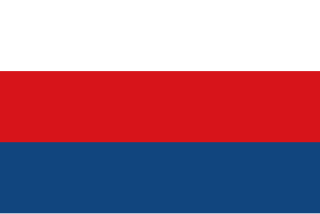
The Protectorate of Bohemia and Moravia was a partially-annexed territory of Nazi Germany that was established on 16 March 1939 after the German occupation of the Czech lands. The protectorate's population was mostly ethnic Czech.

The Party of National Unity was a party created on 21 November 1938 in the Czech part of Czechoslovakia after the occupation of large parts of the country by Germany and Hungary as a last attempt to unify forces to save Czechoslovakia from disappearing. Its Slovak equivalent in the Slovak part of Czechoslovakia was the Hlinka's Slovak Peoples Party - Party of Slovak National Unity created on 8 November.
This article gives an overview of liberalism in the Czech Republic. It is limited to liberal parties with substantial support, mainly proved by having had a representation in parliament. The sign ⇒ denotes another party in that scheme. For inclusion in this scheme it is not necessary that parties label themselves as a liberal party.

Karel Kramář was a Czech politician. He was a representative of the major Czech political party, the Young Czechs, in the Austrian Imperial Council from 1891 to 1915, becoming the party leader in 1897.
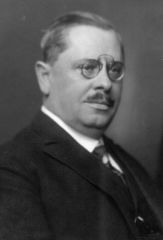
Jan Malypetr was a Czechoslovak politician. As prime minister during the Great Depression he strong-armed Czechoslovakia into a more rapid economic recovery than elsewhere in Europe.

National Unity is a tiny Czech nationalist party which held its founding convention on 3 June 2002 in Zákupy. The party leader is Martin Čejka.
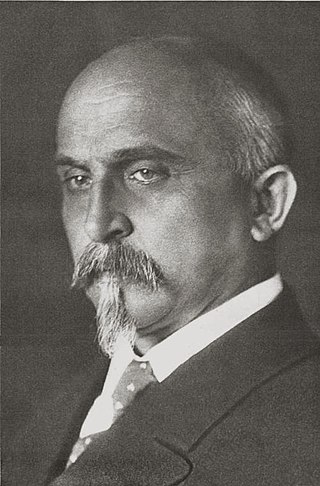
Alois Rašín was a Czech and Czechoslovakian politician, economist, one of the founders of Czechoslovakia and first Ministry for Finance. He was the author of the first law of Czechoslovakia and creator of the country's currency, the Czechoslovak koruna. Rašín was a representative of conservative liberalism and was mortally wounded in assassination for being viewed as a head of the nation's capitalism.

The National Fascist Community was a Czechoslovak Fascist movement led by Radola Gajda, and based on the Fascism of Benito Mussolini.

The Young Czech Party was formed in the Bohemian crown land of Austria-Hungary in 1874. It initiated the democratization of Czech political parties and led to the establishment of the political base of Czechoslovakia.

The Czechoslovak National Democracy, called also Czechoslovak National Democratic Party, was a First Republic right-wing political party in Czechoslovakia.
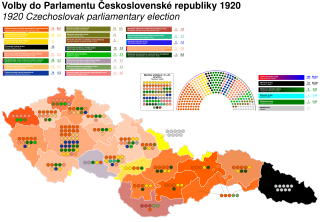
Parliamentary elections were held in Czechoslovakia on 18 and 25 April 1920. Members of the Chamber of Deputies were elected on 18 April and members of the Senate on 25 April. The elections had initially been planned for mid- or late 1919, but had been postponed.
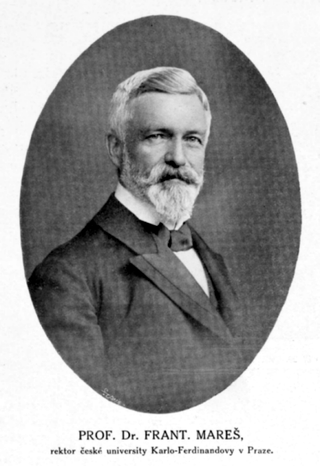
František Mareš was a Czechoslovak professor of physiology and philosophy, and a nationalist politician. He was rector of the Charles University in 1920–21, and a member of the National Democrats.

Jiří Stříbrný was a Czech politician. He was one of the "founding fathers" of the Czechoslovak Republic, but became a quite controversial figure later on. He died in prison in 1955, after being charged with World War II collaboration, although the specifics remain unclear.
The Jewish Party was a political party of the First Czechoslovak Republic. It was founded in 1919 by the Jewish National Council in Prague. It was the strongest Jewish political party in the interwar Czechoslovakia although many Jews were rather active in non-Jewish parties, be they Czech, German or Hungarian. The party adopted a Zionist political program and succeeded in influencing the Czechoslovak government to acknowledge Jews as an official national minority in the constitution of 1920.

Národní listy was a Czech newspaper published in Prague from 1861 to 1941.
No To Brussels - National Democracy or simply the National Democracy is a national-conservative and eurosceptic political party in the Czech Republic. The party was founded in fall 2005 as "Law and Justice - Yes to traditional family, No to corruption and criminality" or simply the "Law and Justice", inspired by Polish party Prawo i Sprawiedliwość.

Parliamentary elections in the First Czechoslovak Republic were held in 1920, 1925, 1929 and 1935. The Czechoslovak National Assembly consisted of two chambers, the Chamber of Deputies and the Senate, both elected through universal suffrage. During the First Republic, many political parties struggled for political influence and only once did a single party muster a quarter of the national vote. Parties were generally set up along ethnic lines.

The National Partnership was the only authorized political party in the Protectorate of Bohemia and Moravia. Membership was mandatory for all Czech male full-aged citizens of the Protectorate.

The National Bank of Czechoslovakia was the central bank of Czechoslovakia between 1926 and 1939, succeeding the Austro-Hungarian Bank after a 6-year interval during which central banking functions were assumed directly by the country’s ministry of finance.
















